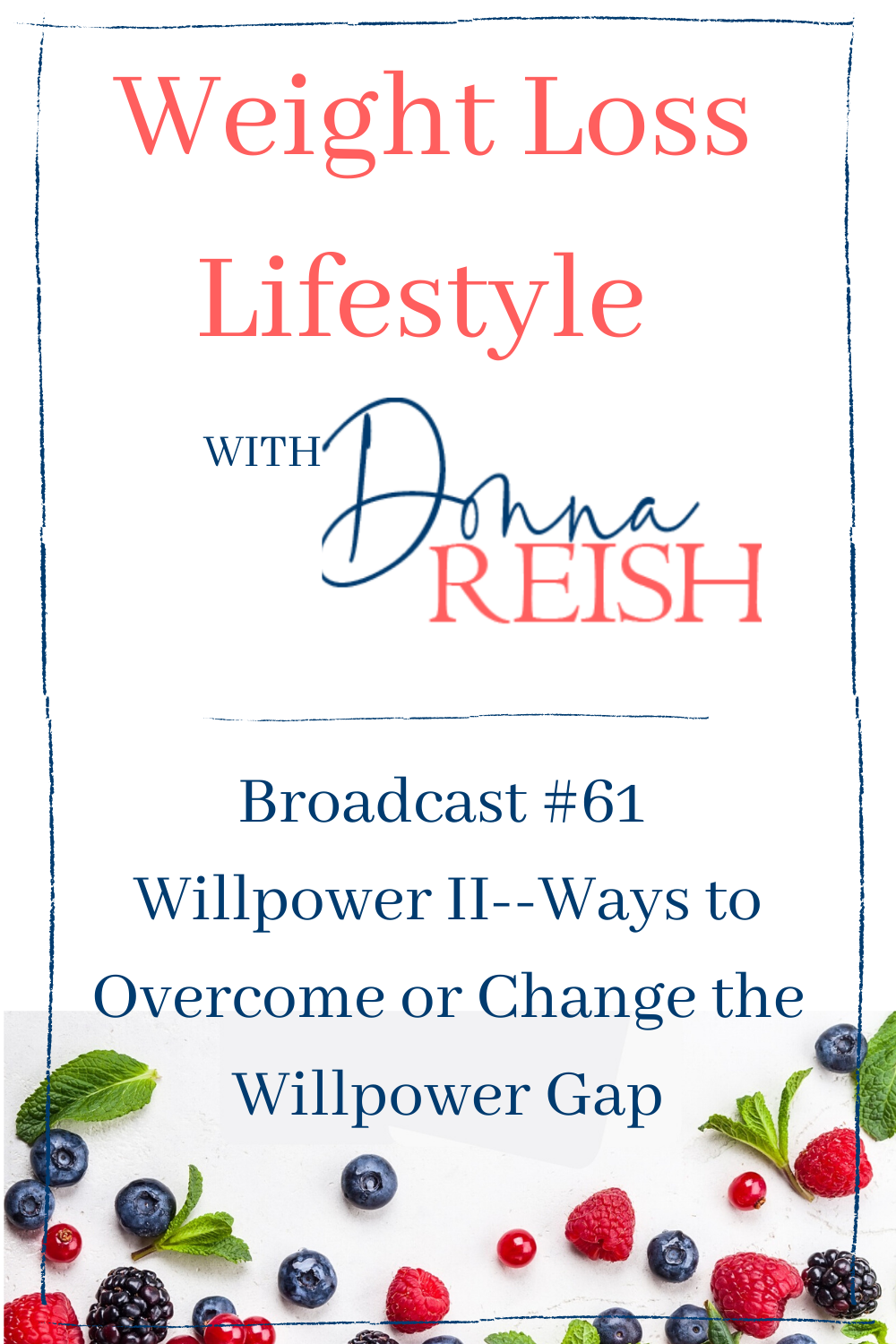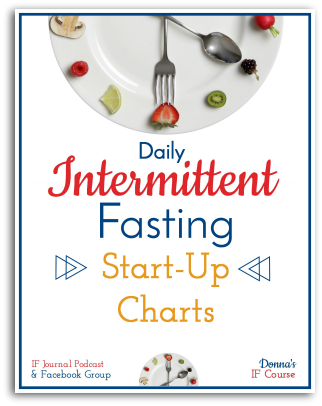
Weight Loss Lifestyle #61: Willpower II–Ways to Overcome or Change the Willpower Gap
In Episode #60, I explained that we have a willpower gap—a gap between the amount of willpower that we need each day and the length of day/number of temptations we are faced with each day.
We can do some things to manufacture more—we can refill some of our stores, we can do intentional self care tasks that give us more, and we can do daily lifestyle things that lead to a bump in willpower.
However, the best way to handle the willpower gap is to use what we have wisely, to reduce the need for so much of it, to control hormones to help us with the lack, and other “use wisely and reduce need” moves.
The first way to use our willpower more wisely is simply to “save it up” during Intermittent Fasting. Such a cool and simple trick to not use it for 119 food related decisions all day.
We also decrease our need for it overall in Intermittent Fasting as we help insulin, ghrelin, and leptin to work amazingly well for us–again through IF!
Next, we can actually NEED less willpower when we create automaticity in our lives! Yep…we can use “tiny habits” (Fogg) and “atomic habits” and “deciding ahead of time” (Castillo) to automatize much of our life!
And you know my love for all things Stephen Guyenet (Hungry Brain)! Finally, we can gradually reduce the extreme dopamine spikes that we get from such seductive, hyper-palatable foods over time (even with little choices)….and guess what? Less willpower will be needed!!
Outline , video, and podcast are below!
I want so many good things for you!
Part I: Review of Willpower
A. Willpower Review
1. What it is
a. Using internal strength to over-ride our brain to do something we don’t want to do or not do something we do want to do
b. Discovered in 1988 to be a “thing”
c. “Overriding a feeling in order to act in a way that is different than you feel like acting
2. All kinds of willpower are used each day adding up to overcoming 4 hours of temptations and 119 food-related decisions per day
B. Willpower needed for too many things each day–It takes willpower to resist (or sit with) over hunger and over desire
1. Over hunger—hunger signals, ghrelin telling us we are empty; leptin not telling us (or us not hearing it) that we are full
2. Over desire—processed foods, frequent eating, sugar and flour concentrations…all lead to overdesire due to neuro transmitters in the brain that tell us that we want more and more of those things each time we have them.
3. Willpower gap—running out of willpower before we run out of day/time/decisions that willpower is needed for.
Part II: Ways to Work With or Overcome Willpower Gap
A. Refill Willpower Stores
1. Ways we might be able to refill lagging willpower
a. Human connection—FB groups, people to text, like-minded people, etc.
b. Meditation—even quick sitting and taking 3 minutes of deep breathing
c. Prayer
d. Gratitude—MANY studies show that gratitude replenishes willpower! (Weekly gratitude list and reading it aloud each day)
e. Service—giving to others
f. Self Care
2. Self care
a. Deciding ahead of time is “adult self care”!
b. Don’t rely on immature/emergency self care—this will feel graspy and will not replenish like adult self care that you have decided ahead of time
c. Read, bath, music, instruments, hobbies, exercise
B. Intermittent Fasting
1. We do not have the willpower gap that we would have from the aforementioned 119 food decisions each day—no decisions at all for 16, 18, 19 hours!
2. We were never intended to …
a. Eat 7-12 times every 24 hours
b. Have such highly-processed, hyper-palatable foods
3. Our willpower is saved for during our eating window
4. Our insulin is kept low since we aren’t spiking it with food. This gives insulin a chance to drop and increase leptin/our ability to hear leptin and “hear the song of satiety” better.
5. When insulin is low, leptin is increased and heard better— we know when we are full more quickly and more thoroughly than eating all the time. We don’t need as much willpower to stop overeating when leptin is heard so clearly.
6. When we fast, we get control of the hunger hormone, ghrelin, so we actually train our body when to be hungry—so less willpower is needed! We are essentially overriding willpower during our fast through “clock hunger” and “ghrelin taming”!
7. Another benefit of leptin sensitivity (being able to hear leptin signals) is that we start to crave healthier foods—again, without willpower and white knuckling in order to eat those healthier foods.
8. Finally, fewer eating instances means fewer dopamine spikes. (See later in outline!)
C. Create Automaticity—Habits, Rituals, and Deciding Ahead of Time
1. Brushing our teeth
a. We brush out teeth with consistency—no sticky notes, timers, phone reminders, leaving things on the counter, charts, etc.!
b. We don’t rely on willpower to brush our teeth
c. We use automaticity, habits, rituals, and deciding ahead of time-as well as the clear desire to do it
d. We brush our teeth AUTOMATICALLY because we have a clear, unambiguous line that we will not cross—I will NEVER leave the house without having my teeth brushed!
e. We have a routine/ritual/automaticity in order for it to happen twice a day
2. We must automatize our eating so that it is more habitual, ritualistic, and automatic
a. Planning and preparing
i. As we plan and prepare, those plans turn into automatic actions and behaviors
ii. Then the plans become habitual and ritualistic
iii. “I got into the habit of”
iv. “I got out of the habit of”
b. Why losing 100 pounds over a decade has actually helped me—plenty of time to make my changes gradually and automatize them and get them to stick
3. Decide Ahead of Time
a. Studies showing we always PLAN to eat better ahead of time—the cake vs. fruit order
b. We always think we can do it when we are planning next week
c. Use this “decide ahead of time” strength to our benefit
d. Decide today WHEN you will eat tomorrow
e. Decide today WHAT you will eat tomorrow (watch for upcoming Protocol Planning broadcasts!)
f. Uses your pre-frontal cortex (adult brain) not toddler brain
g. Uses less willpower since it is decided when you are not in the heat of the moment
D. Reduce Six Seductive Craving Combinations So Dopamine Spikes Are Decreased
1. Dopamine is the habit/desire hormone that makes us want to eat junk food.
2. Every time we eat a processed food or drink a sugary drink, our dopamine is spiked, and we need more and more of those junk foods in order to be satisfied.
3. One way to decrease this over-desire is to decrease the number of eating opportunities
4. Eventually, with the help of leptin, lowered insulin, and grehlin, we will be able to decrease those spikes that need super human willpower to overcome.
5. Decrease one of the three major spikers: flour, sugar, fat…..
(Did you know that you can find all weekly broadcasts {Weight Loss Lifestyle/formerly Donna’s IF Journal} in one place at my website?)












